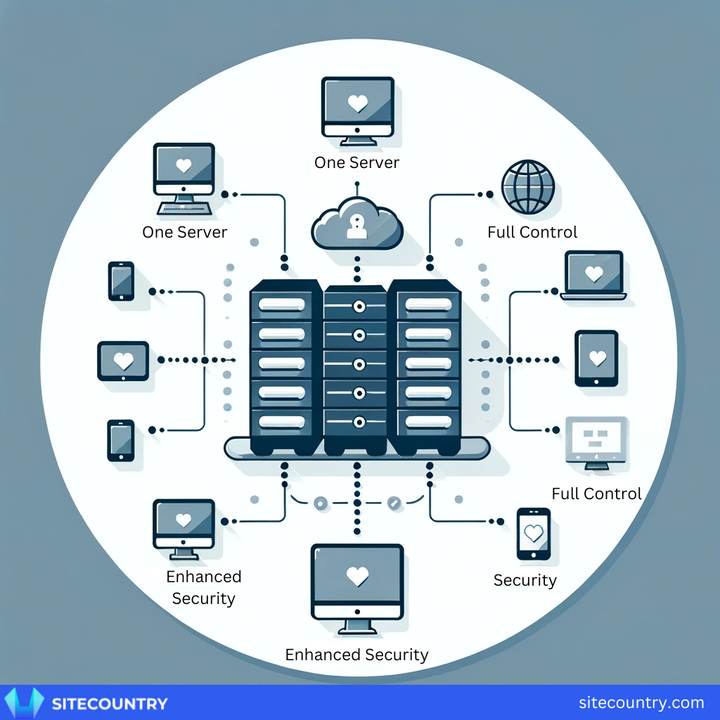Why CDN Matters: A Must-Have for Modern Websites

Ever noticed some websites load super fast, while others feel like they are stuck in slow motion? Well, the secret behind speedy sites is Content Delivery Networks, or CDNs – the heroes that can make your website lightning quick. If you have ever scratched your head wondering why some users of your site take its sweet time for some users then CDNs have the fix.
CDNs work like magic by spreading copies of your website’s stuff to servers all around the world. This means that wherever your visitors are, your site loads instantly. When waiting on pictures and videos is no longer an option for you anymore, CDNs ensure they pop up on the screen without any delay at all. We will now look at how these networks alter a website’s performance so as to guarantee uninterrupted online engagement with every user who visits it.
Common Website Challenges: Life Without CDN
A website’s success in the modern online world largely depends on its performance. Yet, despite this, various obstacles constantly stand in the way with slow page load times, non-uniform user interfaces, and misaligned display of images and videos.

1. Slow Loading Times:
Websites often face a significant challenge – slow loading times. Imagine someone excited to check out your website, only to be met with frustratingly slow loading. Research indicates that users tend to leave websites that don't load fast.
The reasons can vary – from large image files to less-than-optimal code – but the result is the same: user frustration and increased bounce rates. Enter Content Delivery Networks (CDNs), optimizing loading speeds for a smoother user experience.
2. Inconsistent User Experiences:
Visited a sleek website on your computer, only to find it looks odd on your phone? Inconsistencies across devices or browsers can alienate visitors and harm a brand's reputation.
Ensuring a uniform and user-friendly interface across various devices is crucial for retaining and attracting audiences, with CDNs contributing to maintaining a consistent user experience.
3. Issues with Showing Pictures and Videos:
In today's content-rich online landscape, websites often incorporate numerous pictures and videos. However, slow-loading images and videos can test a user's patience and lead them to leave your site.
Ensuring a rapid display of visual content is a challenge, but it's crucial for visitor satisfaction. CDNs play a vital role in optimizing the delivery of images and videos, contributing to a seamless and enjoyable user experience.
Efficient Traffic Handling with CDNs
In the ever-changing online world, managing sudden spikes in website traffic is crucial for smooth performance. CDNs, or Content Delivery Networks, play a key role in helping websites effectively handle these surges without slowing down or causing disruptions.
The Significance of Traffic Surges:
Websites can experience unexpected increases in user traffic due to various reasons like popular content, promotions, or events. When this happens, it can strain a website's servers, leading to slower loading times, a less enjoyable user experience, and even downtime. Addressing these challenges is vital to ensure a positive online presence and seamless interactions with users.
How CDNs Manage Traffic:
CDNs act as smart traffic managers by strategically spreading website content across a network of servers in different locations. During a traffic surge, CDNs automatically direct user requests to the nearest server. This reduces the pressure on the main server and ensures a quicker response, improving overall website performance, especially during peak traffic times.

Advantages of CDN Traffic Management:
Balanced Load Distribution: CDNs evenly distribute traffic across multiple servers, preventing one server from becoming overloaded.
Quick Response: By serving content from nearby servers, CDNs reduce waiting times, making web pages load faster and enhancing the user experience.
Scalability: CDNs offer flexible solutions that can adapt to varying levels of traffic. As demand increases, extra servers can be seamlessly added to the CDN network.
Caching for Speed: CDNs use caching to store copies of static content on various servers. This minimizes the need to fetch data from the main server, optimizing response times.
Reliable Access: With CDNs, websites become more dependable, ensuring users can access them consistently without interruptions, even during unexpected traffic surges.
In essence, CDNs are essential for shielding websites from the impact of sudden traffic spikes, guaranteeing a resilient and high-performing online presence. As the online landscape evolves, integrating CDNs strategically becomes increasingly necessary for websites aiming to offer a smooth user experience, no matter the fluctuating traffic conditions.
Benefits of CDNs:
Integrating CDNs (Content Delivery Networks) into a website brings forth a range of benefits that significantly enhance its overall performance, ensuring a seamless and satisfying user experience.
Improved Speed:
Swift Content Delivery: CDNs strategically distribute website content across multiple servers, reducing the physical distance between users and the server. This results in quicker loading times for web pages, ensuring users access information promptly.
Efficient Caching: CDNs cache static content, storing copies on various servers. This means that users can retrieve content faster as it doesn't need to be fetched from the original server every time.
Enhanced Reliability:
Traffic Load Balancing: CDNs evenly distribute incoming traffic across multiple servers. This prevents overloading of a single server, reducing the risk of crashes or slowdowns during peak usage times.
Distributed Network: The distributed nature of CDNs ensures that if one server encounters issues, others can seamlessly step in, maintaining website availability and reliability.

Optimized User Satisfaction:
Reduced Latency: CDNs serve content from servers geographically closer to users, minimizing latency and ensuring a more responsive and enjoyable browsing experience.
Consistent User Experience: By providing uniform access to content across various devices and locations, CDNs contribute to a consistent and user-friendly interface.
Cost-Efficiency:
Bandwidth Savings: CDNs help reduce the load on the main server by distributing content across multiple servers. This results in lower bandwidth usage and can lead to cost savings for the website owner.
Enhanced Security:
Distributed Security Measures: CDNs often come equipped with security features, including DDoS protection and web application firewalls, adding an extra layer of defense against cyber threats.
Scalability:
Adaptable to Traffic Fluctuations: CDNs are scalable, allowing websites to handle varying levels of traffic. As user demand increases, additional servers can be seamlessly added to the CDN network.
Overall, integrating CDNs into a website is a strategic move to optimize speed, reliability, and user satisfaction, ultimately contributing to a positive online presence and the success of the digital platform.
Choosing the Right CDN: Tips and Considerations
Selecting the appropriate Content Delivery Network (CDN) for a website is a critical decision that directly impacts performance and user experience. Here are essential tips and considerations to guide you in making the right choice:
Selecting the right Content Delivery Network (CDN) for your website is a pivotal decision impacting performance and user experience. Here are the top 5 considerations to guide you:
Understand Your Website's Needs:
Evaluate your website's content type, audience location, and expected traffic volume. Choose a CDN that aligns with these specific requirements.

Performance Metrics:
Assess the CDN's performance in terms of speed, latency, and uptime. Ensure it meets your website's performance goals and can handle traffic spikes effectively.
Global Presence:
Prioritize CDNs with a broad global network of servers. A widespread presence ensures quicker content delivery worldwide, enhancing overall user experience.
Scalability:
Choose a CDN that seamlessly scales with your website's growth. It should adeptly handle increasing traffic demands without compromising performance.
Security Features:
Prioritize CDNs with robust security measures, including DDoS protection and web application firewalls. Ensure the chosen CDN aligns with your website's security requirements.
SiteCountry: Your CDN and Hosting Solution
SiteCountry offers a range of hosting packages designed to meet diverse needs. Their top-rated offerings include:

SiteCountry's hosting solutions, coupled with their Premium CDN services, provide a comprehensive package to enhance website performance, security, and scalability. Choose the right hosting plan that aligns with your specific needs for a seamless online presence.
Future Trends in CDN Technology
As technology advances, key trends in CDN (Content Delivery Network) technology are set to redefine website performance:
Edge Computing Integration:
Integration with edge computing enhances real-time processing, reduces latency, and provides more dynamic content delivery by moving processing power closer to the network edge.
AI-Powered Content Optimization:
The incorporation of AI algorithms dynamically optimizes content delivery based on user behaviors, preferences, and consumption patterns, ensuring a personalized and efficient user experience.
5G Integration for Faster Connectivity:
The rollout of 5G networks will significantly impact CDN capabilities, providing faster connectivity and lower latency. This enables CDNs to deliver content with unprecedented speed, particularly beneficial for bandwidth-intensive applications like augmented reality (AR) and virtual reality (VR).

To sum it up, exploring CDNs reveals a future where the web becomes not just faster but also smarter and more personalized. CDNs, like digital superheroes, lead the way for smooth, safe, and unique online experiences.
As we look ahead to the impact of edge computing, AI magic, and the upcoming 5G wave, CDNs are the driving force behind a faster digital world. Embracing this change is not just an option; it's a must. The web is heading into a speedier era, thanks to the powerful role of Content Delivery Networks.
FAQs
Why is a CDN important?
A CDN is vital for faster content delivery, reducing load times and enhancing user experience globally.
How does a CDN help a website?
CDNs assist websites by caching content on servers worldwide, ensuring quicker access for users and reducing server load.
Does CDN improve website performance?
Yes, a CDN improves website performance by optimizing content delivery, minimizing latency, and enhancing overall speed.
Does every website need a CDN?
While not every website needs a CDN, it's highly beneficial for those seeking improved performance, especially for global audiences.


